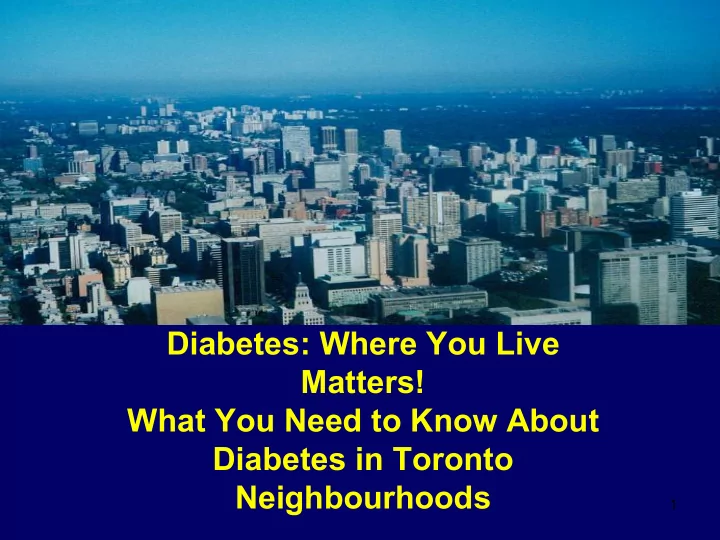

Diabetes: Where You Live Matters! What You Need to Know About Diabetes in Toronto Neighbourhoods 1
Tonight’s Presenters Rick Glazier, MD Centre for Research on Inner City Health, St. Michael’s Hospital & Institute for Clinical Evaluative Sciences Peter Gozdyra, MA Centre for Research on Inner City Health, St. Michael’s Hospital & Institute for Clinical Evaluative Sciences 2
Team • Rick Glazier and Gillian Booth, Editors • Peter Gozdyra, Geographer • Marisa Creatore, Epidemiologist • Anne-Marie Tynan, Coordinator • Students: Kelly Ross, Jonathan Weyman, Amanda Maze 3
Support • St. Michael’s Hospital • BMO Financial • Institute for Clinical Evaluative Sciences 4
Tonight’s Talk • Provide highlights of a large body of work • Stimulate discussion: – Your neighbourhoods – Your health – What role does community play? 5
6
Why Diabetes? • 246 million people with diabetes worldwide in 2007 • Over 2 million Canadians living with diabetes • In Ontario the proportion of people with diabetes rose 69% (from 5.2% to 8.8%) between 1994 and 2005 • Major cause of heart attack, kidney failure, blindness, amputation • Huge impact on quality of life and health care costs 7
What Puts You at Risk? • Age • Family history (genes) • Ethnicity/race ( Aboriginal, Hispanic, South Asian, Asian, African) • Income & Education • Obesity* (*the most important risk factor for type 2) 8
21 st Century Trends Unhealthy diets Sedentary & inactive lifestyles 9
DM Risk factors: How do Wards 7, 8 & 9 compare with Toronto? 10
Toronto Neighbourhoods and Black Creek Community Health Centre Catchment Area 11
Black Creek Community Health Centre Catchment Area and Neighbourhoods 12
Ward 7, 8 & 9 – Selected Information Total Population: 150,321 Low Income Individuals: 22.7% Median Household Income = $45,779 Immigrants: 89,520 (60%) Recent Immigrants: 18,075 (12%) Visible Minorities: 92,615 (62%) People not speaking English or French: 11,525 (7.7%) Source: 2006 Canada Census, Statistics Canada. 13
Income by neighbourhood Data Source: 2006 Census 14 Neighbourhood Environments and Resources for Healthy Living: A Focus on Diabetes in Toronto
Visible minorities Data Source: 2006 Census 15 Neighbourhood Environments and Resources for Healthy Living: A Focus on Diabetes in Toronto
How do You Define a Healthy Neighbourhood? 16
Some Trends Diabetes higher in neighbourhoods with: ↓ Income ↑ Immigration levels 17
Defying the odds In Toronto, some low-income, high immigration neighbourhoods defy this trend e.g. Moss Park, South Parkdale, Regent Park, North St. Jamestown 18
Neighbourhood Resources Neighbourhood Structure 19
20 Neighbourhood Resources
Grocery stores, fruit & vegetable stands 21 Data source: City of Toronto 2004 Employment Survey, Ontario Food Terminal data (Canadian Urban Institute)
Health Services – Primary Care 22 Data source: MD Select, 2002
Travel Time to Diabetes Education Programs 2004 23
24 Parks and Schools
25 Public Recreation Spaces
26 Neighbourhood Structure
27 How ‘Old’ is Your Neighbourhood?
Average Number of Cars per Household 28 Data Source: 2001 Transportation Tomorrow Survey (University of Toronto, 2001) Neighbourhood Environments and Resources for Healthy Living: A Focus on Diabetes in Toronto
Average Wait Times for TTC Vehicles 29
Daily Transit (TTC) Trips per Person 30 Data Source: 2001 Transportation Tomorrow Survey (University of Toronto, 2001) Neighbourhood Environments and Resources for Healthy Living: A Focus on Diabetes in Toronto
Putting It All Together Do more neighbourhood resources that encourage physical activity = more physical activity? Let’s Find Out… 31
How ‘Activity-Friendly’ is Your Neighbourhood? Neighbourhood Features: – more people – more stores – stores closer to your home – fewer cars – less crime 32
Activity-Friendly Index Components of Healthy Resources Index: 1. Car ownership (reversed) 2. Population /km2 of residential area 33 3. Retail services per 10K population 4. Crime per 100K of MaxPop (reversed) 5. Ave distance from residential points to the nearest 5 services (reversed)
Daily Walking/Biking Trips per Person 34 Data Source: 2001 Transportation Tomorrow Survey (University of Toronto, 2001) Neighbourhood Environments and Resources for Healthy Living: A Focus on Diabetes in Toronto
Putting It All Together II Is Neighbourhood Activity ‘Friendliness’ Related to Diabetes? 35
Diabetes Rates Data Source: Ontario Diabetes Database 36 Neighbourhood Environments and Resources for Healthy Living: A Focus on Diabetes in Toronto
Diabetes Rates 1 2, 3 4 1 North St. Jamestown 2 Moss Park 3 Regent Park 4 South Parkdale Data Source: Ontario Diabetes Database 37 Neighbourhood Environments and Resources for Healthy Living: A Focus on Diabetes in Toronto
Defying the Odds WHAT’S GOING ON IN THESE NEIGHBOURHOODS ??? 38
A Tale of 4 Neighbourhoods… South North St. Black Creek Regent Park Parkdale Jamestown Median Household Income $39,755 $24,775 $28,560 $30,237 Population living below the Low income cut-offs (%) 31.0% 58.7% 38.2% 38.3% Recent Immigration (%) 12.8% 15.0% 18.8% 21.8% Visible Minority (%) 78.1% 78.8% 55.5% 68.2% Seniors (%) 10.6% 4.4% 10.7% 8.2% AFI Low High High High Diabetes Rate 7.3% 5.0% 4.9% 4.4% 39
Spatial Relationship: Diabetes and AFI 40 Neighbourhood Environments and Resources for Healthy Living: A Focus on Diabetes in Toronto
Key Finding # 1 Toronto • Diabetes rates are highest in areas of Toronto that have: – lower income levels – a higher proportion of visible minorities – high immigration rates 41
Key Finding # 2 Toronto • High diabetes areas tend to be outside of downtown and have generally worse: – access to resources – activity friendliness 42
Key Finding # 3 Toronto • Neighbourhoods are affected differently: – Downtown high risk areas have lower diabetes rates than expected – Wealthy areas have low diabetes rates, no matter their access to resources or activity friendliness 43
Implications • Make communities more activity friendly • Reduce our dependence on cars • Promotion of healthy lifestyles must go hand-in-hand with neighbourhood resources and opportunities • Improve public transit in under-served areas • Prioritize high risk neighbourhoods 44
Resources Neighbourhood Environments and Resources for Healthy Living: A Focus on Diabetes in Toronto Also available at: www.TorontoHealthProfiles.ca And www.ices.on.ca 45
Recommend
More recommend